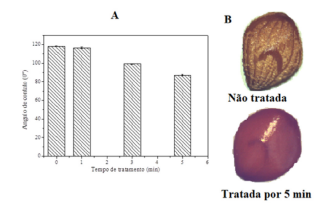Germination, wettability, and imbibition of dormant seeds of Desmanthus virgatus after low-pressure plasma treatment
DOI:
https://doi.org/10.21708/avb.2022.16.1.10425Resumen
The use of an alternative technique to increase the germination of an legume species used in animal feed was investigated based on the effects of low-pressure plasma on the wettability, imbibition, and germination of seeds of Desmanthus virgatus. A conventional nitriding reactor with an argon atmosphere (Ar) and controlled temperature at 30º C was used to apply three different exposure times: 1, 3, and 5 minutes, with a set of intact seeds considered as the control. The experimental design was completely randomized, and the means were compared by the Tukey test at 5% probability to analyze the different experimental conditions tested. The statistical analyses were performed with the software Origin 8.0. The apparent contact angle indicated an increase in the wettable surface with the treatment time, verifying the hydrophilic character of the plasma on the seed. Seeds treated for 3 and 5 minutes showed higher germination than the 1-minute treatment and untreated seeds. In the imbibition test, the leached solution showed lower conductivity in the treated samples than in the untreated sample, indicating less nutrient loss to the solution. The pH remained within the neutral range among the treated samples. The superficial changes in the seeds caused significant gains in the germination parameters, promoting improvement in the indices and rate of germination and contributing to the uniformity of the seed lot with the use of low-pressure plasma as a tool for breaking dormancy.
Descargas

Descargas
Publicado
Número
Sección
Licencia
Autores que publicam na Acta Veterinaria Brasilica concordam com os seguintes termos: a) Autores mantém os direitos autorais e concedem à revista o direito de primeira publicação, com o trabalho simultaneamente licenciado sob a Licença Creative Commons Attribution que permite o compartilhamento do trabalho com reconhecimento da autoria e publicação inicial nesta revista. b) Autores têm autorização para assumir contratos adicionais separadamente, para distribuição não-exclusiva da versão do trabalho publicada nesta revista (ex.: publicar em repositório institucional ou como capítulo de livro), com reconhecimento de autoria e publicação inicial nesta revista. c) Autores têm permissão e são estimulados a publicar e distribuir seu trabalho online (ex.: em repositórios institucionais ou na sua página pessoal) a qualquer ponto antes ou durante o processo editorial, já que isso pode gerar alterações produtivas, bem como aumentar o impacto e a citação do trabalho publicado (Veja O Efeito do Acesso Livre).


 Esta obra está licenciada com uma Licença
Esta obra está licenciada com uma Licença 